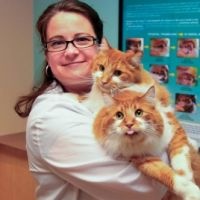Blog
10 Tips for Feline Wellness
July 14, 2015

The good folks at American Association of Feline Practitioners have offered some helpful suggestions to help keep your feline family healthy:
- Make Yearly Veterinary Visits a Routine
Cats need routine veterinary check-ups for longer, happier, and healthier lives. Check-ups should occur at least once per year for all cats, and more frequently for senior cats (over the age of 10) or those with chronic conditions. Annual physical examinations are recommended because veterinarians can assess your cat’s health and often detect conditions before they become significant, helping to manage or cure the conditions before they become painful or costly.
- Don’t Rely on the Internet
Any time there is a change with your cat, don’t assume the problem is behavioral-there may be a medical explanation. Don’t rely on the internet for answers-get your veterinarian’s help to figure out the underlying cause.
- Check Your Cat’s Weight
A 2011 survey conducted by the Association for Pet Obesity Prevention showed that 55% of cats are overweight. Of those cats that were overweight, 15% of the owners believed their pet to be of normal weight. As a guideline, if bodyweight is 20% or greater than the ideal weight, a cat is considered to be obese. Excessive weight can promote arthritic pain, heart disease, diabetes, liver disease, and many other serious conditions. If your cat is overweight, talk to your veterinarian to create a plan that is appropriate for your cat. See obesity in cats for more information
- Create an Enriching Environment
Providing an enriched environment can increase activity, decrease mental stagnation, prevents behavior problems, and enhances their quality of life. Cats need mental stimulation. An enriched environment gives cats opportunities to create their own positive experiences. Read more about creating environmental enrichment for your cat
- Get the Scoop
Most cats will use a litter box readily because of an instinctual desire to cover their eliminations. If there are any behavioral or physical changes to your cat’s elimination, be sure to see your veterinarian. If your cat is vocalizing, missing the box, jumping in/out fast, or not digging at the litter, these may be signs of a medical issue. Learn more about inappropriate elimination
- Brush Up on Oral Care
According to the American Veterinary Dental Society, 70% of cats have some degree of dental disease by age three. If your cat has bad breath, painful teeth or gums, tartar, or gingivitis, their teeth should be professionally cleaned before beginning a home-care routine. Discuss tooth brushing or a home-care routine with your veterinarian. Read more about dental care for cats
- Give Your Cat the Best & Visit a CFP
Commit to giving your cat the very best in feline health care and visit a Cat-Friendly Practice (CFP). CFPs have committed to decreasing the stress associated with the visit and providing a more calming environment. They have taken extra steps to assure they understand a cat’s unique needs and utilize feline-friendly handling to increase the quality of care for your cat. Find out what makes us different
- It’s Okay to be Picky, But Not TOO Picky
Some cats are particular, but many times there may be a medical explanation for any new erratic eating behaviors (unless the cat has always been this way). The issue could be a gastrointestinal problem, diabetes, or any number of other problems – don't wait, contact your veterinarian. If your cat has gone without food for 24 hours or more, contact your veterinarian IMMEDIATELY (a fatty liver disease could result, and hepatic lipidosis can be fatal).
- Watch For Changes in Sleeping Habits
Vocalizing and/or sleeping when your cat typically wouldn’t (changes such as pacing and “talking” overnight or sleeping more during the day) combined with general confusion and/or personality changes (previously outgoing cat becomes a “wallflower”) can be signs of a medical issue such as feline cognitive dysfunction syndrome (“Kitty Alzheimer’s”) in an older cat. Contact your veterinarian right away.
- Take the Stress Out of Vet Visits
58% of cat owners say their cat hates going to the vet. Make trips to the vet less stressful for you and your kitty by visiting a Cat-Friendly Practice. Cats Exclusive Veterinary Center has gone through the rigorous CFP guidelines to ensure we create a calming environment for cats. Stress associated with vet visits starts at home. Don’t forget to acclimate your cat to its carrier by making it a familiar place. Read tips about getting your cat accustomed to a carrier
Adapted from American Association of Feline Practitioners, 10 Tips for Feline Wellness



